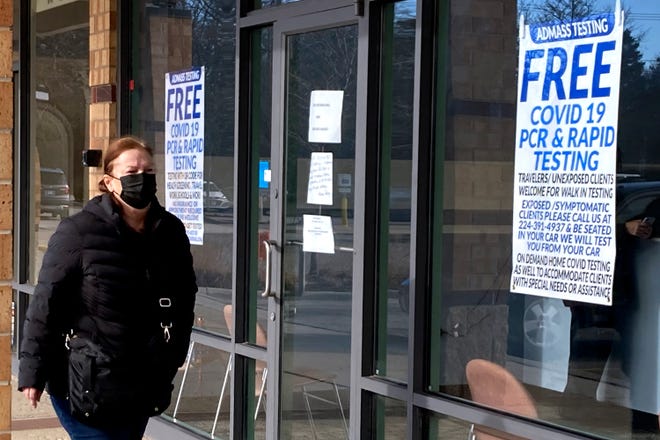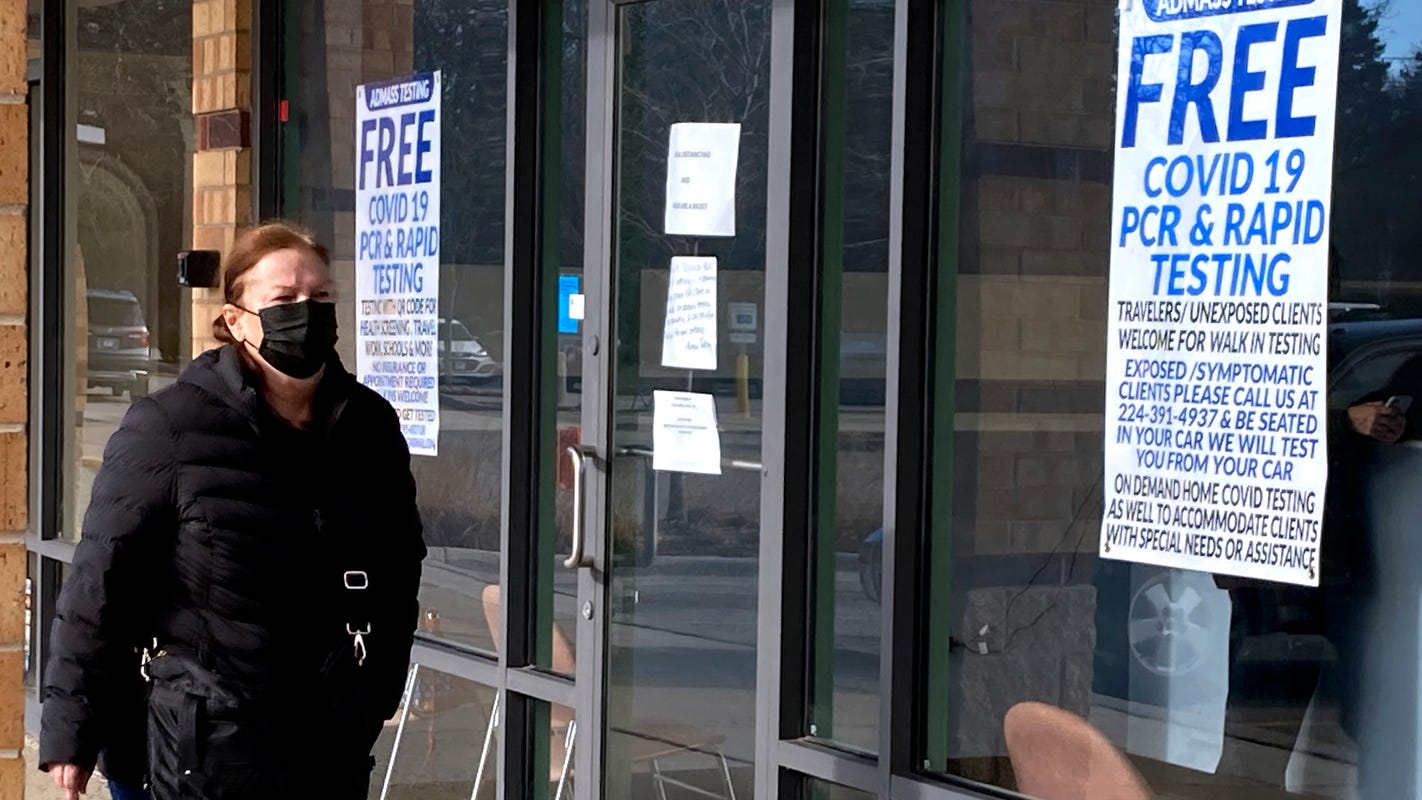More than 3,000 flights have already been delayed or canceled across the nation Sunday amid the latest, omicron-driven coronavirus surge sweeping the industry, the nation and the world.
More than 800 flights entering, leaving or flying within the United States were canceled and over 2,400 were delayed Sunday, according to the tracking website FlightAware. More than 4,000 flights were delayed or canceled Christmas Day as days of scheduling nightmares left holiday travelers scrambling for transportation.
Delta, United and JetBlue have blamed the omicron variant for staffing problems leading to flight cancellations in recent days. United spokesperson Maddie King said staffing shortages were still causing cancellations. It was unclear when normal operations would return.
“This was unexpected,” she said of omicron’s impact on staffing.
Flight delays and cancellations have been a recurring theme this year as airlines have ramped up schedules. Thousands of workers were driven from the industry last year when air travel collapsed, and staffing has not kept up with the resurgence in demand for flights.
Also in the news:
►Even with testing and reporting interrupted by the Christmas holiday, the United States’ case counts surged higher – 1.29 million in a week, or an average of about 184,000 per day, Johns Hopkins University data shows. Hospitalizations were up and deaths also rose slightly, to an average of over 1,300 per day.
►Vice President Kamala Harris declined to blame the unvaccinated for the latest surge. “But it is clear that everyone has the ability to make a choice to save their lives and to prevent hospitalization if they get vaccination and if they get the booster,” she said on “Face the Nation.”
►Mastercard Spending Pulse reported Sunday that U.S. holiday sales had risen 8.5% from a year earlier. The results cover Nov. 1 through Dec. 24.
►Vermont Everyone Eats, a food assistance program helping state residents, restaurants and farmers get through the pandemic, has been extended three months through April 1.
►France has recorded more than 100,000 virus infections in a single day for the first time since the pandemic struck, and COVID-19 hospitalizations have doubled over the past month.
► More than 160 nonprofits in Rhode Island are sharing $5.4 million in federal coronavirus relief funding for housing, behavioral health services, health care, job training, food pantries and child care for those hardest hit by the pandemic.
📈Today’s numbers: The U.S. has recorded more than 52 million confirmed COVID-19 cases and more than 816,000 deaths, according to Johns Hopkins University data. Global totals: More than 279.1 million cases and 5.3 million deaths. More than 204 million Americans – 61.7% – are fully vaccinated, according to the CDC.
📘 What we’re reading: The omicron variant has thrown America’s great return to the office into disarray – perhaps for months. Many companies who had notified employees they would need to come back to the office at least part time early next year have pushed back those plans or are considering doing so. Read more.
Keep refreshing this page for the latest news. Want more? Sign up for USA TODAY’s free Coronavirus Watch newsletter to receive updates directly to your inbox and join our Facebook group.
Fauci expects daily infections to rise ‘much higher’
The “extraordinarily contagious” omicron variant will continue to drive daily coronavirus infections higher across the nation, Dr. Anthony Fauci said Sunday.
“Every day it goes up and up. The last weekly average was about 150,000 (per day) and it likely will go much higher,” Fauci said on ABC’s “This Week.”
President Joe Biden’s chief medical adviser warned that while studies show omicron is less severe in terms of hospitalizations, he said that more cases could still lead to overwhelmed hospitals. And he defended the administration’s efforts to provide more tests amid a shortage. He said wished he had thought about ordering 500 million at-home tests two months ago.
“I think things will improve greatly as we get into January,” he said. “But that doesn’t help us today and tomorrow.”
Fenway Bowl, Military Bowl shelved as surge cripples college football
The Fenway Bowl and Military Bowl were canceled due to the pandemic on Sunday as coronavirus outbreaks at Virginia and Boston College forced the schools to call off postseason plans. The game scheduled for Wednesday at Fenway Park was to pit the Cavaliers against SMU. The Military Bowl scheduled for Monday at in Annapolis, Maryland, between Boston College and East Carolina was canceled because of positive COVID-19 tests at BC.
“This is not the way we wanted to see this season come to an end,” BC coach Jeff Hafley said. “We just do not have enough players to safely play a game.
The Hawaii Bowl was canceled last week after Hawaii withdrew from its game against Memphis. And Rutgers will replace Texas A&M in the Gator Bowl against Wake Forest on New Year’s Eve after the Aggies pulled out because of a lack of available players.
Florida sets infections record two days in a row
Florida hit a new record in the pandemic for the second day in a row with 32,850 new cases reported Saturday. The 31,758 total reported Friday had broken the state’s previous record of more than 27,000 cases set in August during the height of the delta wave in Florida. The current surge is being driven by the spreading of the highly contagious omicron variant, public health experts say.
The swelling number of virus cases created demand for COVID-19 tests, even on Christmas Day. Hours before a testing site opening at Tropical Park in Miami, dozens of cars lined up along a road leading to its entrance. The testing site was open from mid-morning to mid-afternoon, and two other sites in Miami-Dade County were open on Christmas Day.
NBA urges booster shots for players
The NBA’s Christmas message to its teams was a refrain it has been using for weeks: Get boosted.
With the number of players on the league’s health and safety protocols list still hovering around 100 – and with Chicago coach Billy Donovan now dealing with those protocols as well, calling into question his availability for the next few Bulls games – the league and the National Basketball Players Association continue to hammer home the importance of booster shots.
Every NBA team, by Dec. 31, must arrange a booster-shot event for players, staff and family members, the latest mandate from the league in its quest to get its skyrocketing virus numbers under control. The NBA has told teams its data shows that boosters substantially reduce a person’s risk of being infected, and one out of every three players still aren’t boosted – even though 97% of the league is vaccinated.
That comes as the league’s Jan. 5 booster mandate looms for all eligible scorer’s table personnel, team attendants and other staff who have in-person interaction with players or referees. In almost all cases, if people in those positions don’t have boosters by Jan. 5, they won’t be allowed to continue in those jobs.
Positive COVID test? Here’s what to do.
Testing positive for COVID-19 starts a confusing, disruptive and at times frightening process – one that millions of Americans will likely go through in coming weeks as the omicron variant rapidly spreads this holiday season.
First, you need to isolate. That’s a more intense version of quarantining – it means cutting off contact with other people as much as possible, so that you reduce your chances of infecting them. It also means forgoing travel, not going to work and even limiting contact with people in your own household who aren’t infected.
The CDC says it’s a necessary step whether you’re vaccinated or unvaccinated; showing symptoms or feeling fine.
Everyone who tests positive for COVID-19 should also monitor their symptoms. And people who are unvaccinated or at high risk for severe disease should be extra vigilant for symptoms that might require emergency care. Call your doctor for early treatment options.
How long should you isolate? How long will I be contagious? What if you are a close contact with someone who tested positive? Here’s what you should know about omicron and COVID this holiday season.
Contributing: Mike Stucka, USA TODAY; Associated Press

